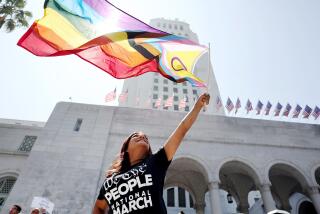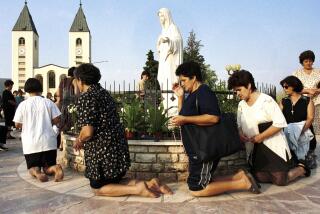Many Catholics Back Married Priests, Easing of Divorce Rules
- Share via
NEW YORK — Opinion surveys of church people often include a mixed lot--both the active and inactive, the practicing and only nominal members. But a study peering strictly at involved, participating Roman Catholics found some unexpected results.
Among changes advocated in the church by majorities of dedicated, active laity and clergy:
- That married men should be allowed to become priests, instead of ordination being limited to celibate males.
- That the church should encourage “communion” between Catholics and other Christians, a sharing in observance of the Lord’s Supper that Catholicism generally forbids.
- hat the church should liberalize its rule banning divorce.
Parish Life Study
These were among findings in the latest report of a long-range Notre Dame Study of Catholic Parish Life, based on in-depth studies of 36 parishes around the country, selected to provide a representative sample of U.S. Catholics.
Since the scientific sample of 2,667 parishioners came from current church rolls, the report said they are active, regular worshipers, more identified with the institutional church than those simply calling themselves “Catholic” in random national surveys.
Concerning the findings that majorities support allowing married clergy, favor liberalizing the church’s position on divorce and reject the church’s ban on contraception, the researchers comment:
“It is important to note that on many of these issues . . . active American Catholic lay persons are willing to move farther than the Vatican has felt desirable.”
Noting the mixed approval and disapproval of various official positions, the study’s research director, David Leege, and Msgr. Joseph Gremillion, head of Notre Dame’s Institute for Pastoral and Social Ministry, said:
Selective Beliefs
“Not only the nonpracticing Catholics included in other surveys but also the active registered parishioners in our study feel comfortable with selecting which of the church’s teachings they will espouse and which they will reject.
“In this respect, American Catholics act very much like the increasingly well-educated, middle-class Americans that they are: they accept human authority less because of its traditional nature and more because of its appropriate positions.
“Yet they remain loyal to the underlying institution, practice its rites, and continue to work for it.”
The study, rather than scoring percentages agreeing or disagreeing, uses a special index of support, ranging from 1, the lowest point, to 4, the highest, with anything above 2.5 constituting the prevailing, or majority, view.
Support ran overwhelmingly strong for the church’s opposition to abortion, but only a weak minority upheld the church ban against use of contraceptives.
‘Not Less Faithful’
The predominant opponents of the ban on contraceptives “are not less faithful in their Mass and Communion practices,” the report notes. “Among younger parishioners nowadays, this teaching is often seen as irrelevant to their lives.”
Parishioners across-the-board registered overwhelming support for the church’s “strong opposition to abortion,” with a breakdown showing that only 5% consider abortion acceptable in most circumstances.
But 69% consider it acceptable in “extreme circumstances” such as threat to the mother’s life, rape or incest, and only 26% consider it never acceptable.
Predominant opinion favored a people-oriented, less-structured and rule-bound church, with more stress on personal spiritual elements, on spreading the faith and on ecumenical relations with other Christians.
Generally, the findings show reinforced inclinations “toward a lay--rather than clerical--church,” and how much “American Catholics have assimilated the participatory values found in American democratic society,” according to the researchers.
Favor Married Priests
While the preponderant view favored married priests, slightly less than a majority favored opening the priesthood to women, the report says. Citing the decline in the number of priests, it adds:
“Americans are pragmatic. . . . To the majority of faithful parishioners, allowing married men to become priests is seen as an appropriate position change.
“While the ordination of women as priests is reported to be close to majority support among all Catholics, it is still shy of that among (active) parishioners. . . .
“While men and women are close to each other on this issue, the educated women in their 20s to 40s are considerably more likely than others to support women’s ordination. Support is stronger among those with some Catholic education than among those who have not attended a Catholic school.”
Many Pastors Agree
Curiously, however, most parishioners underestimated the degree to which pastors supported both ordination of women and married men, their views barely trailing that of parishioners, something the parishioners did not realize.
While Catholicism engages in widespread ecumenical talks with other churches, reaching consensus agreements with Lutherans and Episcopalians, the official church still bars inter-communion, the report noted, adding:
“Yet, our parishioners seem quite willing to encourage communion among Christians.”
More to Read
Sign up for Essential California
The most important California stories and recommendations in your inbox every morning.
You may occasionally receive promotional content from the Los Angeles Times.










